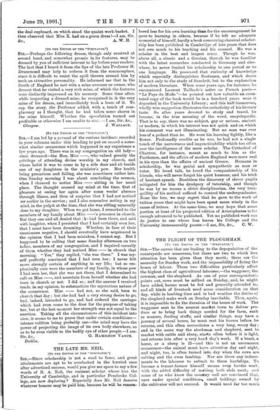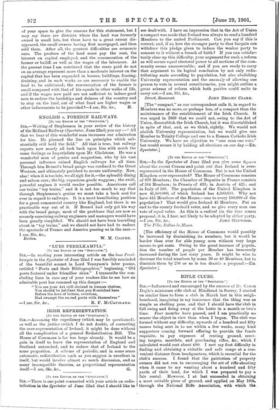THE FLIGHT OF THE PLOUGHMAN.
[To THE EDITOR OF THE "SPECTATOR."]
Sin,—The causes that are leading to the depopulation of the countryside are numerous, but there are two to which less attention has been given than they merit; these are the necessity for Sunday work, and the impossibility of fixing the hours of labour. These two difficulties particularly affect the highest class of agricultural labourer,—the waggoner, the cowman, and the shepherd. As one of your correspondents points out, cows must be milked on Sunday, and, he might have added, horses must be fed and generally attended to, and all kinds of livestock need some consideration on that day, while in lambing time and in bad weather the duties of the shepherd make work on Sunday inevitable. Then, again, it is impossible to fix the duration of the hours of work. The waggoner sent to the nearest market town to deliver pro- duce or to bring back things needed for the farm, such as manure, feeding stuffs, and similar things, may have a journey of several hours, he must rest his horses before he returns, and this often necessitates a very long, weary day ; and in the same way the stockman and shepherd, sent to market with cattle and sheep, starts often before it is light, and returns late after a very hard day's work. If a beast, a horse, or a sheep is ill—and this is not an uncommon occurrence—the animal must have attention day and night, and night, too, is often turned into day when the cows are calving and the ewes lambing. Nor are there any induce- ments to the labourer to submit to these hardships. To become a tenant-farmer himself means eveir harder work, with the added difficulty of making both ends meet; awl some of us who know the country well are convinced that, save under special conditions, small holdings owned by the cultivator will not succeed. It would need far too much
of your space to give the reasons for this statement, but I may say there are districts where the land was formerly owned in small lots, but these have to a great extent dis- appeared, the small owners having first mortgaged, and then sold them. After all, the greatest difficulties are economic ones. The produce of the land must pay the rent, the interest on capital employed, and the remuneration of the farmer or bailiff, as well as the wages of the labourers. At the present time I am convinced that the rents paid do not on an average represent more than a moderate interest on the capital that has been expended in houses, buildings, fencing, draining, and in such works as are necessary to enable the land to be cultivated; the remuneration of the farmer is small compared with that of his equals in other walks of life, and if the wages now paid are not sufficient to induce good men to endure the hardships and dulness of the country and to stay on the land, out of what fund are higher wages or
other inducements to be provided P—I am, Sir, &c., H.





















































 Previous page
Previous page